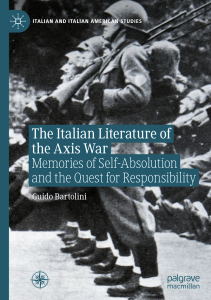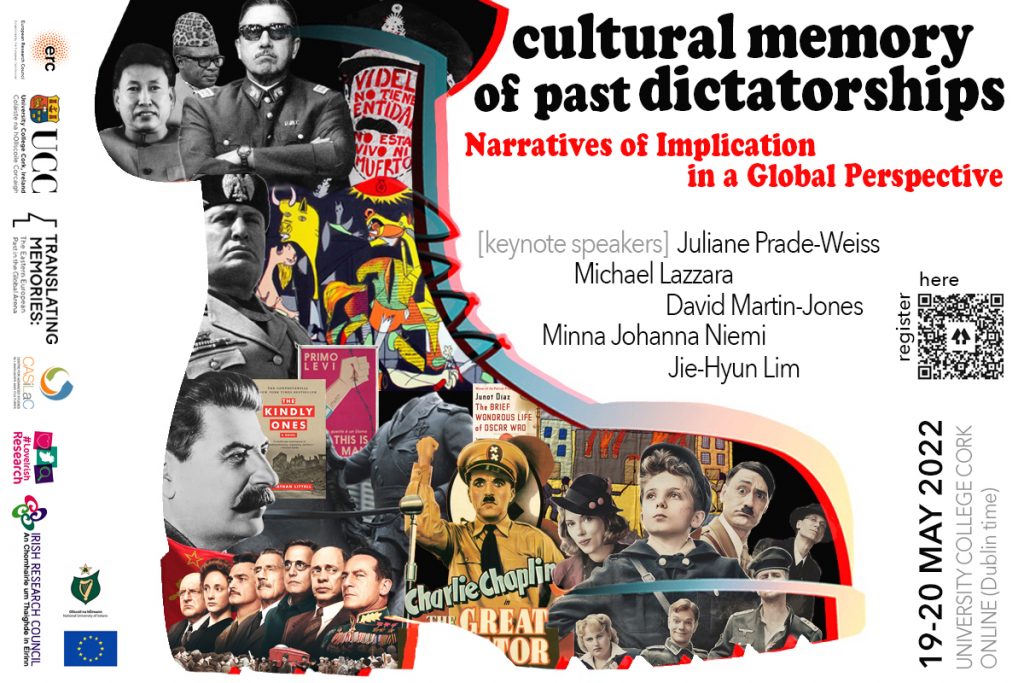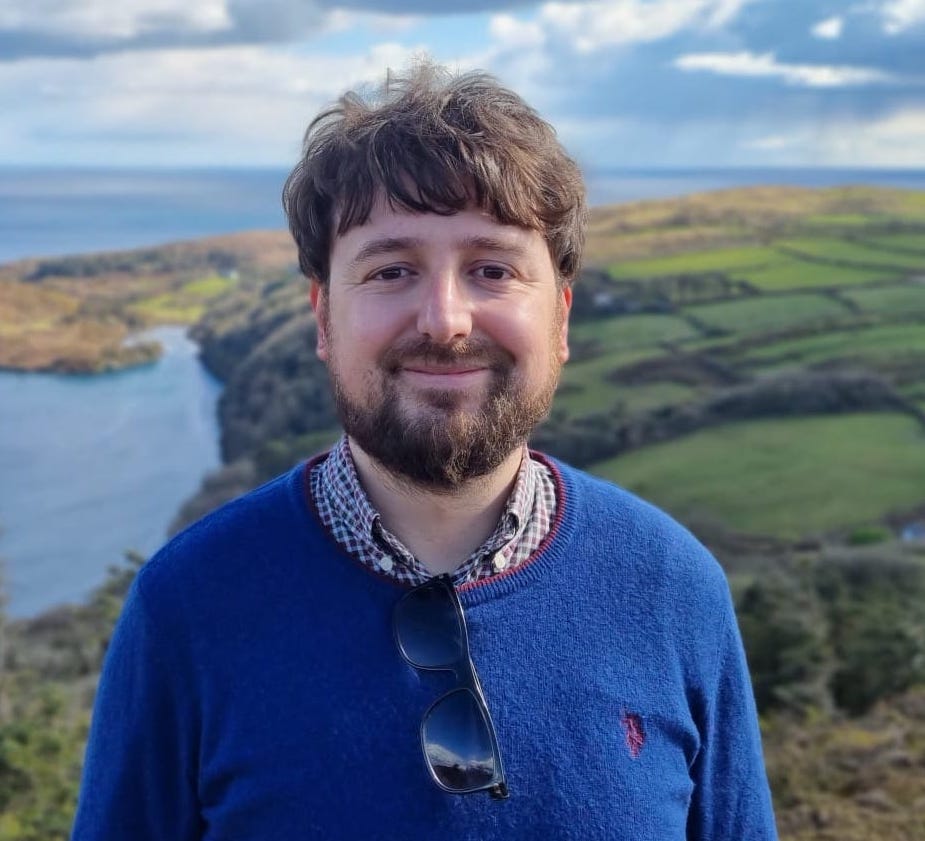
Featured Member: Guido Bartolini
Featured Member shines a spotlight on the diverse research interests of, and the exciting projects undertaken by, those affiliated with the Cultural Memory Studies Initiative. In this thirteenth instalment of the series, we speak to Guido Bartolini, a postdoctoral researcher at Ghent University working on the memory of Fascism in contemporary Italian literature. Dr Bartolini’s current project builds on and extends his previous research on the representation of the Second World War in pre-1989 Italian literature. While his peripatetic career trajectory has taken him from Italy to Belgium via the UK and Ireland, his overall research focus has remained remarkably constant, allowing him to make a singular contribution to literary studies, memory studies, and Italian memory politics. Some of the topics discussed in this conversation are the origins of Dr Bartolini’s interest in issues of memory, his hopes of generating societal impact, the notion of self-absolution for involvement in Fascism and how it is being counteracted, and the pros and cons of finding oneself at a distance from one’s object of study.
- As a scholar of Italian literature, how did you first develop an interest in memory studies?
I grew up in Italy, which is a country—as everyone knows—where the past powerfully manifests itself in everyday life thanks to the rich heritage that can be found in almost every city and village across the country. What is perhaps less known to those who are not familiar with Italian culture is the ubiquity and pervasive diffusion of memories of World War II in the cultural and political fabric of Italian democracy. In the 1990s and early 2000s, memory debates about World War II, Fascism, the Italian Antifascist Resistance, and the Holocaust were everywhere: they circulated through newspapers and television programmes and penetrated both the academic, literary, and historical production interrogating the identity and foundation of the Italian nation.
Although the past was heavily and continuously discussed in those years, I felt that something was not right in the national memory discourse, as too many segments of the painful history of twentieth-century Italy were not actually included in the picture. At the time, we knew very little about the history of Italian colonialism. The wars that Fascist Italy waged, which led to the military occupations of France, Greece, the Balkans, and the Soviet Union, constituted a kind of silent void and remained uncharted territory. We learned about the Holocaust in school, and we reflected in humanist and universalist terms on the inequity of discrimination; and yet, despite its general relevance, that story—in the ways I saw it discussed in my own society—remained above all a German problem. Overall, Italian memory culture conveniently glossed over the most unsettling aspects, which directly called into question the conduct of the Italians.
Perhaps it was easier for me to develop the feeling that something was not right in the Italian politics of memory because of my own family history. My mum was born in 1950s Somalia, in the Italian community that developed there as a result of colonialism—my grandparents had moved there after Fascist Italy conquered Ethiopia. This was a family history that I saw reflected nowhere in the collective memory of my nation and that strongly showed me that—despite what dominant memory narratives contended—Italian democracy was not only the offspring of an Antifascist tradition that had opposed the regime but also the product of Fascism itself and the many injustices it had committed.
Obviously, while I was at university studying Italian literature, all this was very blurred in my mind; it would become somewhat clearer only many years later. Fundamental to this process of maturation was an MA module I took up at Bristol University as an Erasmus student, where I encountered for the first time a memory studies article by Aleida Assmann. Subsequently, during an MSt in Modern Languages at Oxford University, I had the opportunity to delve into Fascist history and culture while working with Professor Guido Bonsaver. This was a paramount experience that helped me identify the area in which I thought most research was needed and in which I could fruitfully apply my uneasiness with Italian memory politics. Hence, in the following years, while doing my PhD at Royal Holloway, University of London with Professor Giuliana Pieri, I worked on the cultural memory of the Fascist wars and occupations during World War II—what I call the Axis War—exploring its literary representation across thirty years of Italian literature.
This research constitutes the basis of my 2021 monograph The Italian Literature of the Axis War: Memories of Self-Absolution and the Quest for Responsibility. This book centres its attention on the literary representation of events that unmistakably position the Italians as perpetrators of wrongdoings, i.e. as invaders and occupiers of other countries in alliance with Nazi Germany. Through the study of a non-canonical corpus of 34 texts, the book deconstructs the self-absolving tropes that dominated Italian memory culture and unmasks the cultural mechanisms that displaced guilt and responsibility for the past.
- Your current research project studies the memory of Fascism in contemporary Italian literature, which, you argue, counteracts the self-absolving tendencies that have long characterized public memory of the Fascist past in Italy. Could you tell us a little more about this project?
My current research as an FWO Senior Postdoctoral Fellow builds on the work I have carried out in the last two years while working with Dr Silvia Ross as a Government of Ireland Postdoctoral Fellow at University College Cork. The starting point of my research is the disaffection that characterizes memory activists and memory scholars in today’s Italy. Contrary to the picture I traced of Italian memory culture in the 1990s and early 2000s—which was ubiquitous but rarely critical—today we live in an era in which Italians may feel a bit more detached from the Fascist past and critical voices have grown exponentially. The claim that Italy has been unable to come to terms and deal with the past—in Italian fare i conti con il passato—has become quite widespread in academic circles. Moreover, although historians in the last two decades have done a huge amount of work in shedding light on Italian crimes during the colonial era and World War II—in this regard, the works by Davide Rodogono, Filippo Focardi, and Nicola Labanca are the first that come to my mind—they have also become quite pessimistic about the possibility of spreading such knowledge across society and making it part of the historical awareness of Italian citizens.
Within this context, I firmly believe that contemporary Italian literature can come to the rescue. Since the late 1990s, there has been an incredible boom of novels about the Fascist past. Works such as those by Carlo Lucarelli, Helena Janeczek, Antonio Pennacchi, Francesca Melandri, and Antonio Scurati now offer complex and multifocal representations of Italy’s Fascist past that do not shy away from addressing the crimes that the Italians committed and thematizing the various degrees of participation, implication, and complicity that allowed Fascism to flourish—and they do so, importantly, through that level of immediacy and emotional involvement that characterizes literature and that enables the creation of heartfelt individual stories that can acquire collective relevance. My goal is to unleash the potential that dwells in this literary production and show the manifold ways in which we can use literary texts to engage with the past in ethically sound terms. In this sense my research develops within the path that has been traced by scholars of cultural memory studies, but it adds to it a pronaunced ethical dimension that I want to bring forward through the application of theories of complicity and responsibility to the study of both literature and memory.
- You engage with the question of whether and how memory studies’ shift away from victim-centredness can foster more productive and responsible ways of narrating and remembering past injustices. What impact do you hope your research will have beyond the academic realm?
The ethical demand of memory that informs our duty to remember past injustices stems first of all from the need to commemorate the victims. As part of what we owe to the victims of the past, however, I think there is also the necessity to comprehend the mechanisms that enabled persecutions and other injustices to happen. I believe that this cannot be achieved without a thorough investigation of the manifold phenomena that are associated with perpetration in all its forms, including structural ones. There are now enough works to back up this claim with a certain degree of precision and articulation. In the past decade, invaluable work has been carried out by scholars who have centred their attention on the experience of perpetrators and thereby contributed to innovating the ways in which we look at past injustices— I am thinking, for instance, of Robert Eaglestone, Joanne Pettitt, Erin McGlothlin, Susanne Knittel, and Zachary Goldberg.
While such innovation centred on the exploration of perpetrators took place, other scholars have further opened up our understanding of the different positionalities that human beings can occupy vis-à-vis injustices. As a result, we now possess a quite specific terminology that, besides the victim-perpetrator dyad, allows us to consider bystanders, beneficiaries, accomplices, and, more in general, those who are implicated—to use Michael Rothberg’s umbrella term—in wrongdoing. This theoretical discussion even goes beyond what is already an extensive, fluid, and interdisciplinary field—memory studies—since it encompasses other areas of research in the humanities, such as what is sometimes called “complicity studies” as well as the philosophical and theoretical work around the notion of responsibility.
My belief is that the interconnection and combination of these different streams of academic research can have—and is indeed having—a transformative effect on the ways we relate to the past and actually allows us to develop constructive answers to the limits and problems that several scholars have found in the state of memory politics in the West. I’m referring here to recent works by Lea David, Sarah Gensburger, Sandrine Lefranc, and Valentina Pisanty that, in different ways, have criticized naturalized assumptions about memory work, which are often based on implicit and ready-made frameworks such as the ideas of duty of memory and coming to terms with the past. The works of these scholars have made a very important contribution to current scholarship as they oblige us to question the meaning of what we do.
While I very much welcome such sceptical critiques of the foundations of memory studies, it seems to me that these works tend to outline a pessimistic view that in the end risks denying the value of memory politics and memory work. By contrast, I adopt a much more optimistic perspective on the importance of such cultural work. My hope is that through my research I can contribute to giving some theoretical foundation to such optimism, showing how the notions of complicity, responsibility, and implication can be the basis of a renewed historical awareness that can foster solidarity. In my view, literary texts are a key component of this process. By promoting their use as a critical platform to think about the past, I hope to go beyond the academic realm and make an impact on education processes that can later affect memory dynamics on a larger scale.
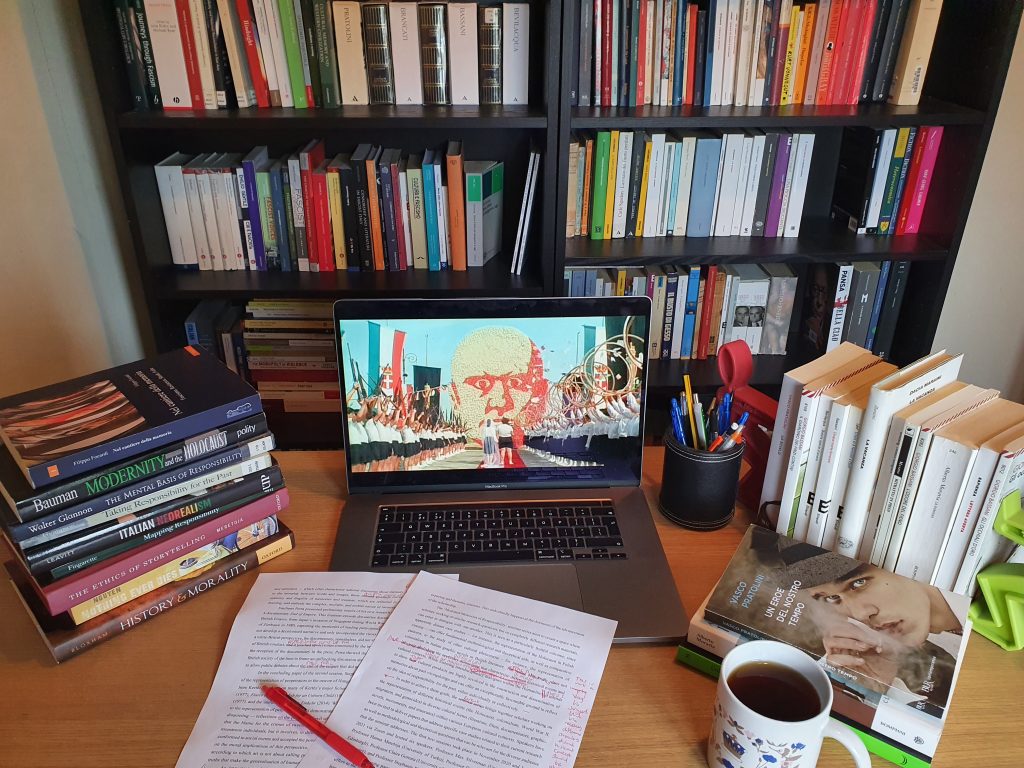
- While your focus is on Italy, your research participates in larger debates around issues of perpetration, guilt, complicity, and implication that preoccupy memory scholars around the world. What, in your view, stands out about the Italian case? What can be learned from it that might be applicable to other contexts?
If my overall research endeavour is based on optimistic views about the power of memory and literature, when it comes to trying to learn something from specific historical experiences my outlook becomes rather grim and I tend to focus on negative aspects. Hence, if I should tell one thing that Italian memory culture can teach us, it is that we should be very careful in developing models to fight injustices that, in the end, find their main answer in patterns of collective, organized, political resistance.
Since the end of World War II, Italian memory culture has pushed for such a model and asked citizens to be politically committed and fight against discrimination and intolerance in its various forms—which is the positive ethical demand that lies behind the many “Antifascist” calls that have characterized Italian culture and society. The historical precedent that informed these calls of actions was the Italian Resistance, the Antifascist war that many citizens fought after the country’s surrender in World War II on 8 September 1943 and the beginning of Germany’s military occupation.
Despite such strong political memory centred on the notion of resistance, the Italian Republic has not been spared from being home to numerous neo-Fascist parties—which constituted the political milieu from which Giorgia Meloni’s Brothers of Italy originated. This memory culture has not impeded the diffusion of myths, lies, and partial accounts, which have depicted Fascism as a light-hearted dictatorship that did not commit serious crimes and defended the national interest carrying out “good things”, such as the modernization of the country through numerous infrastructures.
The failure of the Italian Antifascist tradition to prevent the formation and widespread diffusion of such unacceptable understandings of the past—what Cristina Baldassini called Italy’s indulgent memory of Mussolini and Fascism—should sound an alarm about the effectiveness of any memory work that aims to oppose and criticize the past in an antagonistic perspective. I think that such memory work can be effective only if, at the same time, it also offers more experiential and self-critical reflections that can reveal processes of diffused complicities and foster the idea of responsibility.
- Are there any specific texts, concepts, or methods from memory studies that you have found particularly useful?
My research is very much indebted to the amazing theoretical work that Astrid Erll has carried out in the field of cultural memory studies. In terms of concepts, I find Michael Rothberg’s “implicated subject” an extremely productive notion, which gave me a precise terminology to grapple with problems on which I had been reflecting for years. Besides these scholars, whose work has profoundly informed my understanding of memory dynamics, I would like to refer to three books that have recently had a tremendous impact on my thinking.
 The first one is Hanna Meretoja’s The Ethics of Storytelling: Narrative Hermeneutics, History, and the Possible (2018). In my view, the main merit of this book is that it helps us stress that literary texts that engage with past injustices are not ethically productive by default but only have a potential to foster an ethical understanding of reality, which depends on the specific ways their narrative is constructed—Meretoja discusses at least six aspects that can support such ethically fruitful engagement with reality.
The first one is Hanna Meretoja’s The Ethics of Storytelling: Narrative Hermeneutics, History, and the Possible (2018). In my view, the main merit of this book is that it helps us stress that literary texts that engage with past injustices are not ethically productive by default but only have a potential to foster an ethical understanding of reality, which depends on the specific ways their narrative is constructed—Meretoja discusses at least six aspects that can support such ethically fruitful engagement with reality.
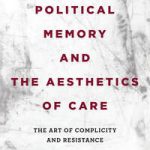 The second book is Mihaela Mihai’s The Politics of Memory and the Aesthetics of Care: The Art of Complicity and Resistance (2022). Besides the incredibly accurate language in which it is written, the book makes a fundamental contribution to the deconstruction of national memory cultures, showing through three specific case studies that national memories are often built around a “double erasure” that overlooks stories of impure resistance and diffused complicities. The validity and productivity of Mihai’s work is proven by the fact that her framework can be perfectly applied to other national contexts, such as the Italian one.
The second book is Mihaela Mihai’s The Politics of Memory and the Aesthetics of Care: The Art of Complicity and Resistance (2022). Besides the incredibly accurate language in which it is written, the book makes a fundamental contribution to the deconstruction of national memory cultures, showing through three specific case studies that national memories are often built around a “double erasure” that overlooks stories of impure resistance and diffused complicities. The validity and productivity of Mihai’s work is proven by the fact that her framework can be perfectly applied to other national contexts, such as the Italian one.
 Finally, the third work that I would like to mention is James Booth’s Memory, Historic Injustice, and Responsibility (2019). This philosophical essay counterbalances accounts of responsibility that tend to overemphasize its dependence on a present temporal dimension in which individuals can act to redress past wrongs. Booth convincingly argues that our responsibility for the past is not only an invitation to act in the present for the future, but also a relationship that ties us to those human beings who inhabited the planet before us and who do not stop being subjects of justice just because they are dead. I find it a very intriguing claim that has great importance for research in memory studies.
Finally, the third work that I would like to mention is James Booth’s Memory, Historic Injustice, and Responsibility (2019). This philosophical essay counterbalances accounts of responsibility that tend to overemphasize its dependence on a present temporal dimension in which individuals can act to redress past wrongs. Booth convincingly argues that our responsibility for the past is not only an invitation to act in the present for the future, but also a relationship that ties us to those human beings who inhabited the planet before us and who do not stop being subjects of justice just because they are dead. I find it a very intriguing claim that has great importance for research in memory studies.
- You work on Italian literature but have spent most of your career so far in an Anglophone environment. Have you experienced this geographic, cultural, and linguistic distance from your object of study as a challenge, a problem, or an opportunity?
These three dimensions obviously co-exist and interact. Overall, however, I have tended to see the distance from my object of study as an opportunity. As I said, my research interests are the direct results of my first experiences abroad as an Erasmus student. Studying and working in the UK’s higher education system has been a fundamental learning experience for me, which trained me to think in transdisciplinary terms and through dynamic exchanges between textual close readings and theoretical, extra-literary theories.
Although I will always be grateful to the UK, which remains a second home for me, in the years I have spent there I have never been interested in replacing my Italian formation with a British one. For me, the most important thing has always been the cross-fertilization and borrowings between different systems and traditions that would eventually allow me to look at my own country and its culture with different eyes, closer to those of a stranger. I have found in such defamiliarization from one’s habits and culture—which does not imply a rejection of that cultural system—an incredible stimulus for critical thinking.
As part of this process, the opportunities I have had in other research environments—first in Ireland and now in Belgium—have been crucial. These experiences have expanded my baggage and nourished my comparative interest in memory dynamics at the European level, which is the direction in which my work is progressively evolving.
- Humanities scholarship is often said to be a lonely endeavour. Is that your experience as well? How important is collaboration to your research?
It is clear that the work we do is always somehow collaborative—not only do we carry out research within specific working groups and academic environments, but, in a more essential way, producing scholarly work is a dialogic process that requires the combination of different voices coming from varied localities and temporalities. Moreover, the research topics that each one of us investigates are usually too large to be sufficiently addressed by an individual, so exchanges, debates, communication, and peer learning are at the core of our work.
Having said that, I genuinely find academic research to be a lonely endeavour. I don’t think that the problem lies so much in the great amount of time that we must spend in quiet libraries or thinking about research issues by ourselves. The problem for me is rather due to the rhythm of the contemporary academy—something that is probably related to the parcellization of knowledge in neocapitalist societies—that erodes the time for authentic exchanges. It seems to me that everyone is too busy with their own agenda and we are all losing the capacity to listen to one another.
In the past years, I have tried to counteract this through collaborative initiatives that aim to create spaces for encounters through conferences, seminar series, and editorial work. In this regard, I was lucky to collaborate with young and enthusiastic colleagues such as Joe Ford and Selena Daly (with whom I co-organized the seminar series Mediating Memories of Responsibility), Diana Popa (with whom I co-curated the conference Cultural Memory of Past Dictatorships: Narratives of Implication in a Global Perspective), Giovanni Vitali (whom I helped with the organization of the Writing the World Wars symposium), and Stefano Bellin (with whom I am co-organizing, together with Michael Niblett, the conference Culture and Global Responsibility: Rethinking Habitability in the Age of the Anthropocene).
I find in the creation and animation of events of this kind, as much as in editorial activities in which I am currently involved, a potential remedy to the structural loneliness that characterizes academic work—although, as I said, authentic exchange is never guaranteed, and we should always cherish the actual moments when this happens. I hope that during my time at Ghent University I will be able to create more of these opportunities for real dialogue and exchange.
Works Cited
BALDASSINI, C. (2008). L’ombra di Mussolini: L’Italia moderata e la memoria del fascismo 1945–1960. Rubbettino.
BARTOLINI, G. (2021). The Italian Literature of the Axis War: Memories of Self-Absolution and the Quest for Responsibility. Palgrave Macmillan.
BOOTH, J. (2019). Memory, Historic Injustice, and Responsibility. Routledge.
DAVID, L. (2020). The Emergence of the “Dealing with the Past” Agenda: Sociological Thoughts on Its Negative Impact on the Ground. Modern Languages Open, 1, 1-14.
EAGLESTONE, R. (2011). Avoiding Evil in Perpetrator Fiction. Holocaust Studies 17(2-3), 13-26.
ERLL, A. (2011). Memory in Culture. Palgrave Macmillan.
FOCARDI, F. (2013). Il cattivo tedesco e il bravo italiano. Laterza.
GENSBURGER, S., LEFRANC, S. (2020). Beyond Memory: Can We Really Learn from the Past? Palgrave Macmillan.
KNITTEL, S., GOLDBERG, Z. (eds.). (2018). The Routledge International Handbook of Perpetrator Studies. Routledge.
LABANCA, N. (2002). Oltremare: Storia dell’espansione coloniale italiana. Il Mulino.
McGLOTHLIN, E. (2021). The Mind of the Holocaust Perpetrator in Fiction and Nonfiction. Wayne State University Press.
MERETOJA, H. (2018). The Ethics of Storytelling: Narrative Hermeneutics, History, and the Possible. New York: Oxford University Press.
MIHAI, M. (2022) Political Memory and The Aesthetics of Care: The Art of Complicity and Resistance. Stanford University Press.
PETTITT, J. (2020). What is Holocaust Perpetrator Fiction? Journal of European Studies, 50(4), 360–372.
PISANTY, V. (2020) I guardiani della memoria. Bompiani.
RODOGNO, D. (2003). Il nuovo ordine mediterrane: Le politiche di occupazione dell’Italia fascista in Europa (1940-1943). Bollati Boringhieri.
ROTHBERG, M. (2019). The Implicated Subject: Beyond Victims and Perpetrators. Stanford University Press.
Interview conducted via email by Stef Craps.

